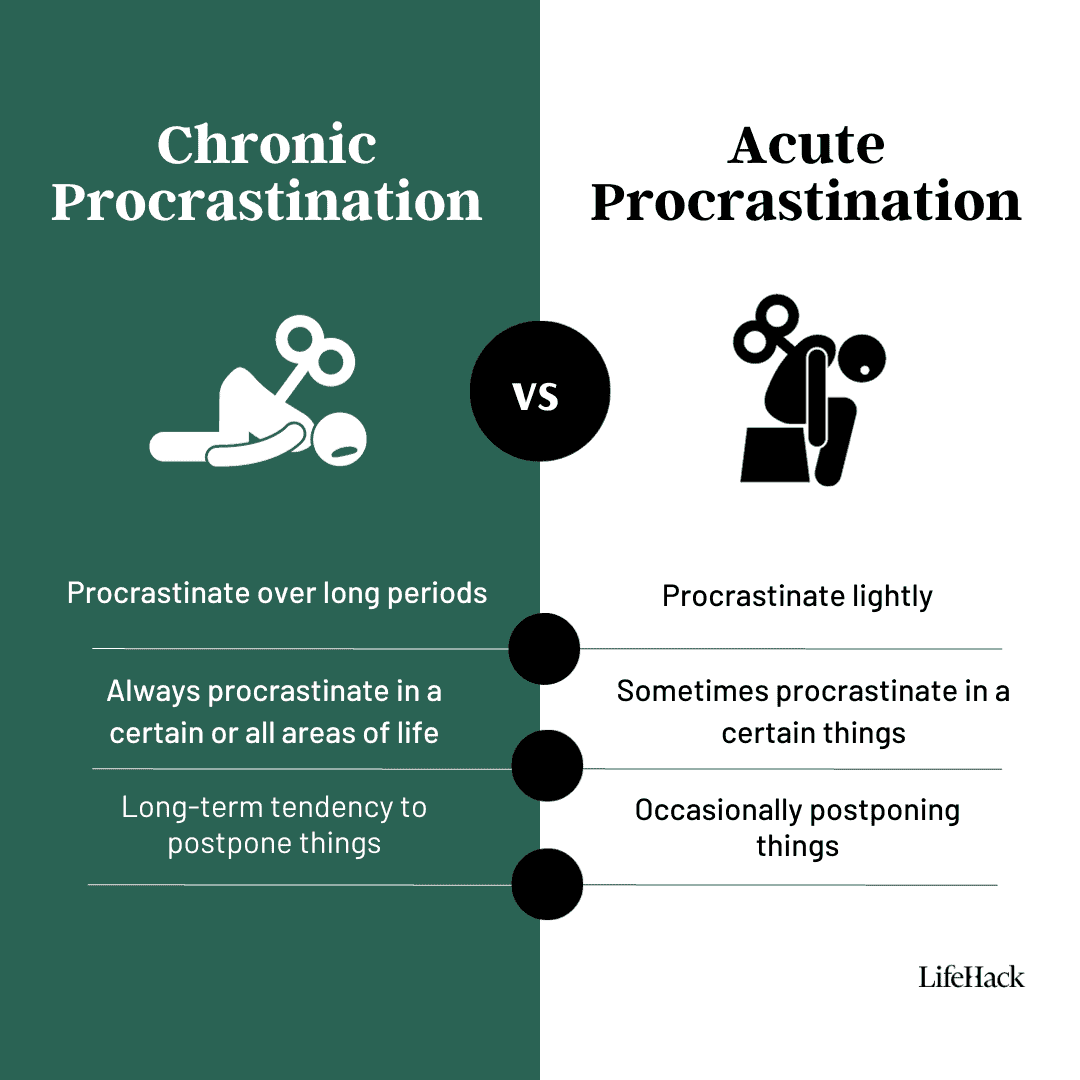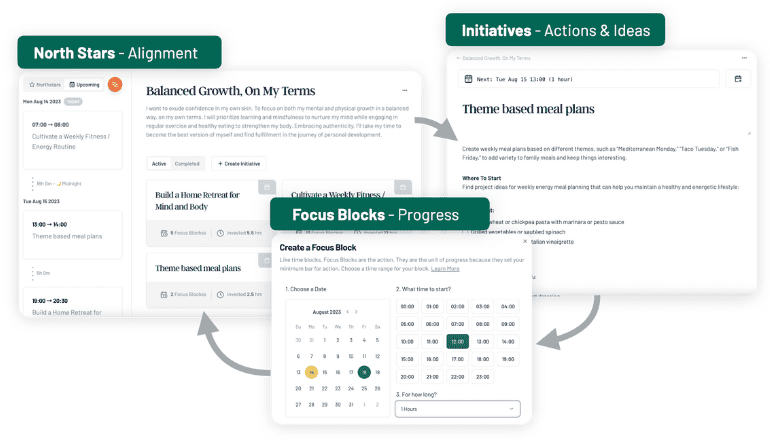Chronic procrastination—it’s that nagging pull to delay tasks, the call of the snooze button you just can’t ignore, the endless deferring of what needs to be done. It’s not just the occasional “I’ll do it tomorrow,” but a relentless pattern that sweeps through your days, weeks, and even years.
For some, procrastination might be an every-now-and-then incident, for others, it’s an epidemic. Indeed, according to the diligent research of Dr. Joseph Ferrari, a staggering 20% of individuals identify themselves as chronic procrastinators.[1] Imagine that, one in every five people locked in a constant tango with delay.
Why does this matter? Because we need to understand that chronic procrastination isn’t merely about laziness or poor time management—it’s a serious issue that can impede progress, hamper personal growth, and even take a toll on mental health. Understanding chronic procrastination is like decoding a cryptic puzzle. Only once we dissect it, comprehend it, can we then deal with it effectively.
Table of Contents
Chronic Procrastination vs. Acute Procrastination
Procrastination isn’t just a one-size-fits-all affair; there are nuances to it. Chronic and acute procrastination are the two common types.
Chronic procrastination is a long-term habit of unnecessary delay.[2] Think of it as the uninvited guest who moves in and refuses to leave.
On the other hand, acute procrastination is like that occasional gatecrasher—it shows up, makes a mess, but leaves relatively quickly.
When Severity Makes a Difference
The intensity of procrastination also counts.[3] For instance, if someone procrastinates only lightly—for a few minutes and on minor things—their behavior might not be seen as chronic procrastination, even if it stretches over long periods.
One Domain or Many?
Some chronic procrastinators have specific arenas where they falter. They might always postpone house chores or always delay workplace duties. We can dub them as “chronic academic procrastinators” or “chronic workplace procrastinators”.
On the flip side, there are those who procrastinate across multiple or even all areas of life, the “chronic procrastinators” in the true sense.
The Long-Term Tendency of Delay
Chronic procrastination isn’t about how long you delay a single task. It’s about the long-term tendency to postpone things, repeatedly.
A chronic procrastinator might only delay tasks for a few hours or days at a time, but if this habit stretches over years, it still counts as chronic procrastination.
That said, persistently postponing things for long periods also fits the bill, as it showcases a long-term tendency to delay.
In both cases, the keyword is ‘long-term.’ If it’s a recurring theme in the movie of your life, it’s chronic procrastination.
Recognizing Chronic Procrastination
So, how do you know if you’re in its grasp? Are there signs?
Yes, there are — and they’re not as subtle as you might think:
1. A Rocky Relationship with Deadlines
Chronic procrastinators often wrestle with deadlines. They’re the ones making a mad dash to finish a report in the eleventh hour, or handing in assignments with the ink still fresh.
2. A Life-Wide Epidemic
Then there’s the breadth of procrastination. If you find yourself delaying not just at work, but at home, in your hobbies, and in your relationships, you’re not looking at isolated incidents, but a chronic issue.
3. Frequent Procrastination
Frequency is another indicator. Is procrastination your unwelcome daily guest, your constant companion? If it’s a more regular part of your life than your morning coffee, you might be a chronic procrastinator.
4. The Lure of Distractions
Chronic procrastinators are often easily distracted. If you can’t resist the siren call of social media when there’s work to be done, that’s a sign of chronic procrastination.
5. The Ripple Effect: Relationships in the Balance
Procrastination can cause turbulence in your relationships. If your loved ones are growing tired of your constant ‘laters’, it’s time to take a hard look at your habits.
6. Filling Time with Trivial Tasks
If you’re tackling your third load of laundry while your presentation remains untouched, you’re likely choosing easy over necessary.
Chronic procrastinators often fill their time with trivial tasks to avoid the big ones.
7. Your Health Is Affected
The physical impact can’t be ignored either. Lost sleep over that looming deadline, or stress eating because of unfinished tasks? Your body is waving a red flag.
8. Persisting in the Face of Negative Consequences
Finally, if you’ve faced negative consequences—lost jobs, dinged credit, stressed relationships—but still can’t seem to break the procrastination cycle, you’re exhibiting a major sign of chronic procrastination.
But don’t despair. Recognition is the first step toward progress.
Causes of Chronic Procrastination
There are 2 major causes of chronic procrastination:
1. Emotions at the Wheel
Procrastination is not always about laziness, nor is it purely about a lack of know-how. More often than not, it’s deeply rooted in our emotional states.
Recent research[4] makes a compelling connection between our mood and the act of procrastination. It’s a struggle between what we feel and what we delay.
Simply put, we’re not postponing tasks just because they’re hard, but because of the emotional rollercoaster we associate with them.
Imagine this: you’re looking at a task on your to-do list, and it instantly makes you think of the irritation and frustration it brought you the last time. Or perhaps, you’ve built it up in your mind to be this gargantuan, difficult monster, even if you’ve never tackled it before. Either way, these feelings act as barriers.
So, what do you do? You put the task on the back burner, telling yourself that tomorrow will be a better day to confront those emotions. It’s about evading those preconceived ideas and dodging the emotional distress.
In essence, procrastination becomes your emotional shield, your go-to strategy when you want to sidestep those uneasy feelings. It’s a coping mechanism. Instead of facing the feelings head-on, you avoid the task, hoping for a more emotionally suited day. This approach might give temporary relief, but it’s a recipe for long-term stagnation.
2. The Deeper Root: A Mental Health Symptom
Sometimes, procrastination isn’t just about dodging unpleasant feelings. It can be a symptom of deeper mental health issues, like anxiety, depression, or ADHD.
Anxiety: Fear’s Delaying Effect
For instance, if you’re dealing with anxiety, your tasks might seem like steep mountains filled with “what ifs” and worst-case scenarios. This fear can handcuff you in the present, delaying your climb.
Perfectionism’s Paralysis
There’s a sneaky connection between anxiety, perfectionism, and procrastination too,[5] which is known as perfectionist paralysis.
If you’re scared that you won’t be able to do something perfectly, you might prefer not to do it at all. You delay, hoping for a moment of perfect readiness that never comes.
Depression: The Energy Drain
With its habit of gnawing away at your energy and self-esteem, depression can also be a big contributor to procrastination.
When motivation runs dry, tasks tend to pile up. You might delay responsibilities, not because they’re tough, but because you doubt your abilities to tackle them.
ADHD: A Focus-Driven Detour
And let’s not forget ADHD, which has inattention symptoms like distractibility, concentration difficulties, and hyperfocus. These can all pave the way to procrastination, creating a labyrinth of delays.[6]
The Cycle of Procrastination
These underlying issues often trigger procrastination cycles that can solidify this behavior in the long term.
Imagine someone who procrastinates due to anxiety. The delay leads to poor performance, which fuels more anxiety and sets them up for more procrastination in the future. It’s a vicious cycle, looping again and again, building a stronghold of chronic procrastination.
Understanding that chronic procrastination isn’t just about time management—it’s about managing your emotions, beliefs, and, in some cases, addressing underlying mental health issues is important to breaking free from procrastination.
How to Deal With Chronic Procrastination
Tackling procrastination is a journey. And like most journeys, it’s easier with a roadmap and perhaps, a co-pilot. Here are two effective routes that can steer you away from the land of eternal tomorrows:
1. The Self-Help Route
Want to take a shot at breaking the cycle on your own? Consider this: the internet is filled with resources, but not all are cut from the same cloth.
Besides putting together this comprehensive guide which stands as a beacon for those lost in the maze of procrastination, my team and I have also developed the Time Flow System to help you get into actions easily and start to get things done.
It’s not just about methods; it’s about understanding the root of your delays and then curating a personalized approach to overcome them.
Think of it as a toolkit; every tool has its purpose, and with a little trial and error, you’ll find what works best for you.
2. Seek Guidance from a Therapist
If the weight of chronic procrastination feels too heavy to lift alone, it might be time to call in the experts.
If you’ve been a serial postponeer and the ripples of delay are crashing into your work life, personal relationships, or mental well-being, it’s time to consider therapy.
A therapist does more than just listen. They’re trained to help you unearth emotional triggers, shining a light on those dark corners where anxieties and fears reside. They can also spot any underlying mental health issues that might be contributing to your procrastination habit.
More than just digging deep, therapy arms you with strategies to counter negative self-talk and reshape unproductive thought patterns. It’s about equipping you with the tools and the insight to not just break the cycle of delay, but to also ensure it doesn’t re-establish its grip.
Whether you choose the self-help path or lean on the expertise of a therapist, know that progress is possible. All you need is the will to start.
Final Thoughts
Chronic procrastination—this pervasive pattern of delay isn’t just about tomorrow’s to-do list. It’s a complex web spun from emotional discomfort, negative self-talk, and in some cases, underlying mental health issues.
It influences not just what we do, but who we are—playing out in our jobs, our relationships, and our sense of self-worth.
Recognizing chronic procrastination isn’t a sign of failure; it’s a lightbulb moment. An invitation to understand better, to dig deeper, and to usher in change. It matters because you matter. Your time, your potential, your peace of mind—they’re worth fighting for.
Reference
| [1] | ^ | American Psychological Association: Psychology of Procrastination: Why People Put Off Important Tasks Until the Last Minute |
| [2] | ^ | Carleton University: Conceptualization and Operationalization of Delay: Development and Validation of the Multifaceted Measure of Academic Procrastination and the Delay Questionnaire |
| [3] | ^ | Cognitive Behaviour Therapy: Differentiating Procrastinators from Each Other: A Cluster Analysis |
| [4] | ^ | The University of Sheffield: Procrastination and the priority of short-term mood regulation: Consequences for future self |
| [5] | ^ | Cognitive Behaviour Therapy: The unique contribution of perfectionistic cognitions to anxiety disorder symptoms in a treatment-seeking sample |
| [6] | ^ | Int J Methods Psychiatr Res.: The relation between procrastination and symptoms of attention‐deficit hyperactivity disorder (ADHD) in undergraduate students |














































